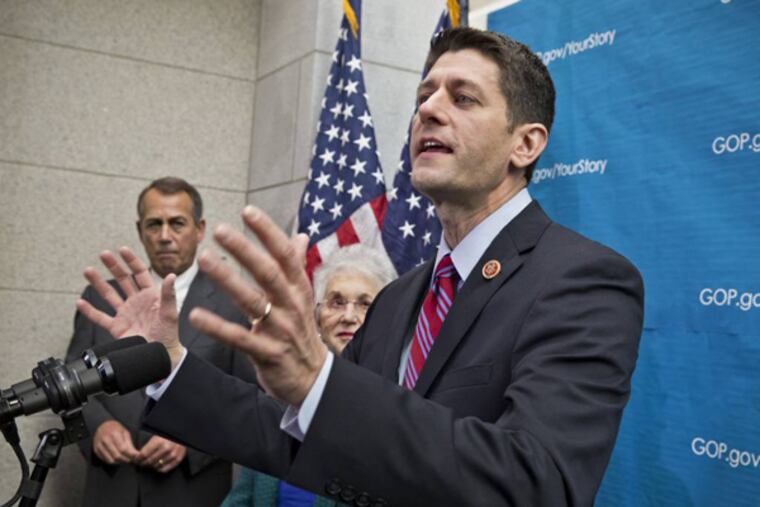Deal cuts two ways for Ryan
Bipartisan budget accord he helped reach is hailed and assailed in his party.

WASHINGTON - Rep. Paul Ryan likened his two-year budget agreement with Democrats to taking a few steps in the right direction.
But the bipartisan deal also carries potential value for Republicans and Ryan himself at a time when the party lacks a clear leader ahead of the 2014 election. If the agreement eventually comes to represent the badly needed bridge between Republican factions, Ryan was its builder.
In winning House passage of the bill last week, Mitt Romney's 2012 running mate pushed fellow conservatives to recognize the realities of divided government and take a more measured approach after a party-crippling government shutdown in October.
The compromise Ryan (R., Wis.) negotiated with Sen. Patty Murray (D., Wash.) represents a new, pronounced effort by Republicans to avoid more self-inflicted wounds and begin assembling a governing agenda as an alternative to Democrats.
"To really do what we think needs to be done, we are going to have to win some elections and in the meantime let's try and make this divided government work," Ryan said. "I think our constituents are expecting a little more from us. They're expecting us to not keep shutting the government down, they're expecting us to pay the bills."
Ryan's stature among Republicans as a policy leader was established by writing blueprints on overhauling entitlement programs and curbing federal spending, well before he joined Romney's presidential ticket.
The 43-year-old aficionado of Ayn Rand could jump into the 2016 White House race after next year's elections or eventually try to succeed House Speaker John A. Boehner (R., Ohio).
But there also could be negative political consequences for Ryan in the budget mini-bargain.
The deal puts him on the wrong side of several outside conservative groups, including Heritage Action and the Club for Growth, which rallied opposition to the bill and keep tabs on how lawmakers hew to their views.
Two potential presidential rivals, GOP Sens. Rand Paul of Kentucky and Marco Rubio of Florida, were quick to oppose the bill, saying its immediate effect is to increase government spending.
The measure, which sailed through the House on Thursday, aims to avoid future shutdowns.
It replaces $65 billion in across-the-board spending cuts, known as sequestration, that were set for this year and next, with about $85 billion in savings during the next decade. The Senate is to vote on the bill this week.
Some conservatives said the approach boosts deficits for two years before it starts cutting them, with no guarantee that future Congresses and administrations would stick to the plan.
But Rep. Patrick McHenry (R., N.C.), a conservative who voted for the bill, said Ryan "is deeply thoughtful on all of these issues. That goes a long way with us rank-and-file members."